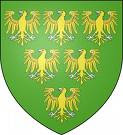On my recent visit to Worcester, my main focus was the beautiful chantry containing the tomb of Prince Arthur, eldest son of Henry VII. But Arthur is not the only royal tomb inside Worcester Cathedral - the tomb of King John is also there. John has perhaps the blackest reputation of any King of England, with perhaps the exception of Richard III - but unlike Richard III he has very few supporters who try to defend him. As the fifth son of Henry II and Eleanor of Aquitaine, John was not expected to play any significant role in history, and was always over-shadowed by his elder brothers, earning him the nicknames 'John Lackland' and 'John Softsword'.
John's reign is also written off as a disaster - the loss of the Angevin Empire, his treatment of the clergy, falling foul of the Papacy, his lust for his young wife Isabella of Angeloume , the murder of his nephew Arthur, his greed/taxation and of course Magna Carta, his surrender to the barons in 1215. Throw in tales of Robin Hood, and John is pretty much done for.
In a précis for his defence, the Angevin Empire was far too big to be ruled by one person, and it's break-up inspired John to create the English navy, primogeniture had not been fully established in England for inheritance, and,at 12, Isabella would have been of little interest to John, but her lands certainly would have been. Chroniclers of the time were usually churchmen, and therefore unlikely to be supporters of John after his fall-out with the Papacy and his refusal to go on crusade. When the Pope placed an interdict on England, John set about fining the clergy and made money from the situation. It's highly likely the loss of the 'crown jewels' in the Wash was exaggerated. John was also faced, as regent, for raising taxation in order to ransom his brother Richard, and inherited debts from him. As for Magna Carta, John immediately went back on his word, and the document really came to prominence centuries later when it was raised to defeat a different monarch. In it's time, it did not achieve that status.
There's no doubt there was something about John's character that lacked the charisma of his brothers and the loyalty they inspired. Despite this, he was the only member of his family to spend considerable time in England and to be even buried there. I had hoped to post some pictures of John's tomb, but despite taking about 20, only 2 came out clearly - just John's luck, eh? here's one of them.
Below is a sketch of John's tomb from the 19th Century.
And here is a much better photo of the tomb. The effigy and tomb were completed in 1232 -16 years after John's death. You can see the similarities with Prince Arthur's tomb and that of Griffiths ap Ryce.
The reason for this was that in 1529 John's tomb was opened, and may have actually been moved slightly. The tomb was opened again in 1797, and John's remains analysed. John was found to be 5 ft 6½inches. He was dressed in a robe of crimson damask, but by 1797 most of the embroidery had deteriorated. There were also the remains of a sword and parts of the scabbard. It was John's wish to be buried in Worcester having visited it several times during his lifetime - "I will that my body be buried in the church of St. Mary and St. Wulfstan of Worcester". John was the only member of his family to be buried in England. I've never seen it, but have been told by someone who has, that John's thumb bone was removed, placed in a casket and is kept in the archives of Worcester Cathedral.
1 week ago







5 comments:
Anerje, I will keep urging you to read Sharon Penman'a novels, especially Here Be Dragons and Devil's Brood. I think you would like her portrayal of John. Of all authors she's the one who tries to "understand"...
Thanks Kasia - I guess I will add it to the ever-growing book list. She does use remarkably similar titles to Jean Plaidy.
Great post! I've seen John's tomb in Worcester, but don't have any pics of it, unfortunately. He fascinates me and I'm not really sure what I think of him.
He is an intriguing character - you have to wonder just how much damage was done to his reputation with his quarrel with the papacy and clergy.
Heh, he should have talked about getting foul of the pope with his cousin Otto - the German kings and emperors were used to that. John can be glad he got away without excommunication.
Post a Comment